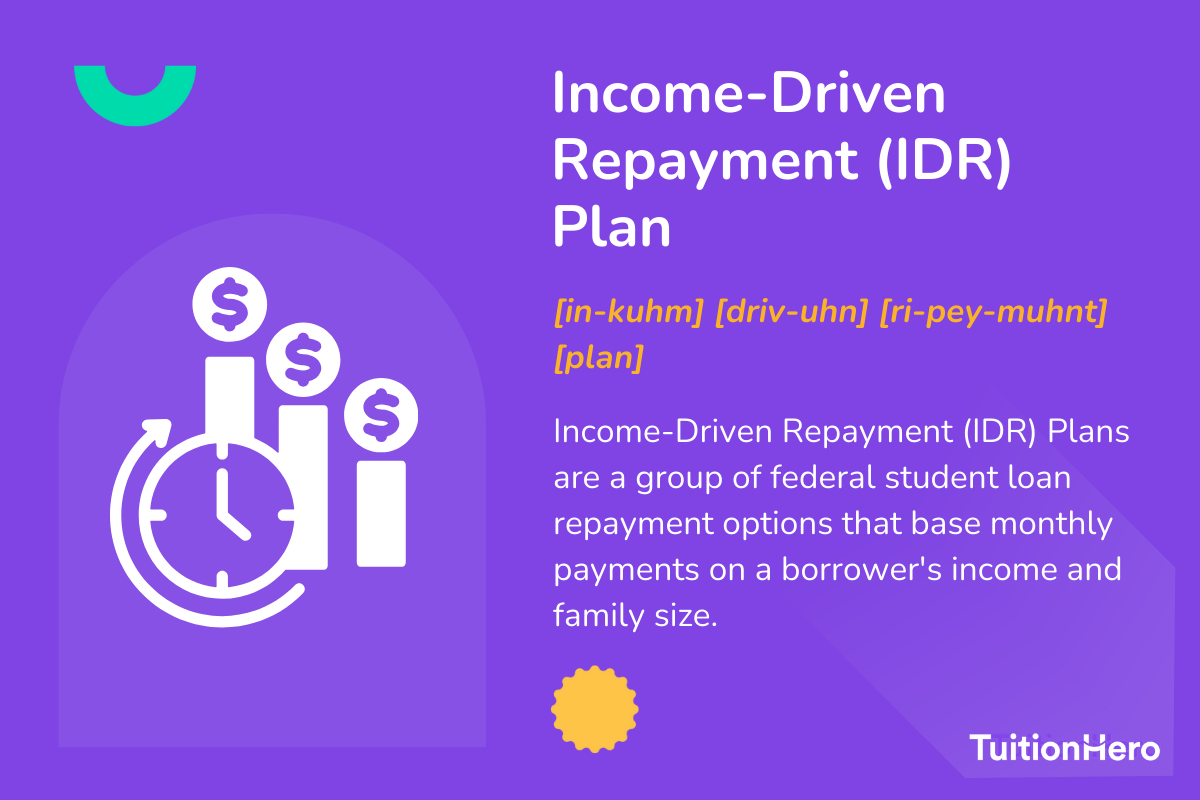Advertiser Disclosure
Last update: November 16, 2024
7 minutes read
Income-Driven Repayment (IDR) Plan
Wondering how an Income-Driven Repayment Plan can ease your student loan burden? Learn the key benefits and how to apply today.

By Brian Flaherty, B.A. Economics
Edited by Rachel Lauren, B.A. in Business and Political Economy
Learn more about our editorial standards



By Brian Flaherty, B.A. Economics
Edited by Rachel Lauren, B.A. in Business and Political Economy
Learn more about our editorial standards
Student loan repayment can be confusing, but income-driven repayment (IDR) plans are important for borrowers because they can potentially offer relief and flexibility. In this post, you'll learn the details of income-driven repayment plans and why they’re a great choice for borrowers who need payment relief. For more detailed options on managing your student loans, exploring how to refinance student loans might offer you the insight you're seeking.

Key takeaways
- Annual income recalculation can adjust your monthly payments
- Loan forgiveness is possible after 20-25 years of qualifying payments
- Communicate big income changes to your loan servicer promptly
Income-driven repayment (IDR) plan
When it comes to managing your student loans, considering an income-driven repayment (IDR) plan is essential. These plans are designed to make your student loan debt more manageable by reducing your monthly payments to a portion of your discretionary income, rather than standard principal and interest payments.

Currently, the Department of Education offers four separate IDR plans:
- The Income-Based Repayment (IBR) Plan
- The Pay as You Earn (PAYE) Plan
- The Saving on a Valuable Education (SAVE) Plan
- The Income-Contingent Repayment (ICR) Plan
As of July 2024, no new enrollees in the PAYE or ICR plans are being accepted, with few exceptions. Therefore, if you’re considering an IDR plan today, the IBR or SAVE plans are your best bet.
Here's why it's important to understand how an IDR plan works:
An IDR plan adjusts your monthly payment amount based on your income and family size, not the total amount you owe. This approach means as your income grows, your payments do too (and vice-versa).
In most circumstances, though, your payments will be less than what you'd pay under the standard 10-year repayment plan. In fact, several IDR plans (like the PAYE and IBR plans) cap your monthly payments at a maximum of the 10-year plan amount.
- Eligibility and how to apply: Not every borrower or loan qualifies for IDR. Generally, federal student loans like Direct Subsidized and Unsubsidized Loans are eligible. If you don’t have a Direct loan, you’ll need to apply for a consolidation loan to be eligible. To secure an IDR plan, apply through the Federal Student Aid website and recertify your income every year.
- Benefits and drawbacks: One of the major benefits is the potential for loan forgiveness after 20-25 years of qualifying payments. However, it's essential to be aware that lower payments may result in paying more interest over the life of the loan.
Understanding how your payments are calculated under an IDR plan is crucial. They are typically set at 10% to 15% of your discretionary income (though the newest SAVE plan is as low as 5%).
This flexibility is why many find IDR plans appealing. It helps you pay in a way that aligns with what you can afford, giving you some extra room in your budget.
To learn more, consider learning about choosing the right student loan option to complement your knowledge of IDR plans. Now, let's keep exploring the income-driven repayment (IDR) plan and the factors that can affect your repayment plan.
Adjustments to IDR plans
The Department of Education requires an annual update of your income and family size to adjust your monthly payment amount under an IDR plan. This could either increase or decrease your payments depending on changes in your financial situation.
If you experience a big drop in income or an increase in your family size, this can reduce your monthly payment to as low as $0 per month if you meet certain criteria. If you’re considering a change in employment or marital status, read about how gross income is calculated as it plays a key role in determining your adjusted payment.
After making 20-25 years of qualifying monthly payments under an IDR plan, any remaining loan balance may be forgiven. However, it's important to know that the forgiven amount might be taxable as income depending on the state you live in.
This long-term benefit requires careful planning and consideration of potential tax implications in the future. To understand more, explore how income-driven repayment plans offer loan forgiveness and the conditions that apply.
Managing fluctuations in income
Strategies for unexpected income changes
Life can be unpredictable, and sudden changes to your income might leave you questioning how to manage your IDR payments. Firstly, it’s important to communicate any significant income changes to your loan servicer as soon as possible to adjust your monthly payment. Plus, exploring side gigs or temporary work might help improve your financial situation without drastically changing your IDR payments.

TuitionHero Tip
For tips on saving money while in college and managing costs more effectively, consider reading about saving money as a student.
Preventing default and maintaining good standing
The importance of regular communication with your loan servicer
To avoid default, it’s crucial to maintain open lines of communication with your loan servicer, especially if you expect to have a hard time making payments. If you face financial hardship, you might qualify for a temporary reduction or even a payment pause.
Avoiding default helps protect your credit score and ensures you remain eligible for potential forgiveness or other benefits. Consider learning about how student loans affect credit scores. Now let’s look at some data highlighting key aspects of IDR plans:
Feature | Detail |
|---|---|
Monthly Payment Calculation | 5-20% of discretionary income |
Eligibility Requirements | Direct Loans |
Recertification | Annual, based on updated income/family size |
Loan Forgiveness | After 20-25 years of qualifying payments |
Impact of Income Fluctuation | Must report changes to adjust payment |
This data demonstrates the essential qualities of an IDR plan, highlighting how important it is for borrowers to stay informed and proactive in managing their student loans.
Compare private student loans now
TuitionHero simplifies your student loan decision, with multiple top loans side-by-side.
Compare Rates
Dos and don'ts of navigating an income-driven repayment plan
Understanding and managing an income-driven repayment (IDR) plan is important for your finances. To help streamline this process, setting clear guidelines on what to do and what to avoid can affect your financial well-being and long-term loan management strategy.
Do
Regularly update income and family size
Explore loan forgiveness options
Communicate openly with your loan servicer
Consider refinancing if your financial situation improves significantly
Don't
Assume your payments remain static
Ignore annual recertification notices
Hide changes in your financial situation
Miss payments without seeking assistance

Advantages and disadvantages of income-driven repayment plans
Enrolling in an income-driven repayment plan offers a path towards more manageable student loan payments tailored to your income and family size. This approach allows for flexibility and relief for borrowers under financial strain, but it does come with its downsides.
- Payments adjusted to income ensure you're not overwhelmed by debt.
- Opportunity for loan forgiveness after 20-25 years can relieve long-term financial burden.
- Annual recalculation of payment amounts offers flexibility as financial situations change.
- Reduction to $0 payments is possible during times of financial hardship.
- Increased interest costs over time as lower payments extend the life of the loan.
- Tax implications for forgiven loans can introduce unexpected future costs.
- Annual paperwork requirement to recertify income and family size can be tiresome.
- Potential increase in monthly payments if your income rises significantly.

Why trust TuitionHero
At TuitionHero, we simplify the complex world of student loans. We offer easy-to-understand resources for choosing income-based repayment plans and navigating financial aid. Our platform provides guidance on private loans, refinancing, scholarships, and managing credit cards. We're here to help you make informed decisions about your financial future.
Frequently asked questions (FAQ)
Enrolling in an IDR plan itself doesn’t hurt your credit score. Consistent, on-time payments, as required by your IDR plan, can positively affect your credit score. However, any periods of reduced payment or forbearance might negatively affect your credit score, so ensure you can afford the calculated payments before signing up for an IDR plan.
If your income changes significantly during the year, you have the option to recalculate your monthly payment amount under an IDR plan. You should inform your loan servicer of the income change as soon as possible to adjust your payments, ensuring they’re still manageable and reflect your current financial situation.
Some IDR plans have a cap on monthly payments, including the IBR and PAYE plans. Under these plans, your payments will never be higher than what you would have paid under the standard 10-year repayment plan, based on the loan amount you owed when you first enrolled in an IDR plan. This ensures that your payments stay within a manageable range, even if your income increases a lot.
Final thoughts
Understanding how an income-driven repayment (IDR) plan works is important for students and parents dealing with student loans. Knowing the rules, who can qualify, and how it might affect your financial situation helps you make smart choices for your finances.
At TuitionHero, we support you at every step, from exploring your options to connecting you with resources and tools that help you manage your student loans effectively. For more insights on managing your student loans, consider exploring our comprehensive resources on student loans and find out how we can help you turn financial complexity into simplicity.
Source
Author

Brian Flaherty
Brian is a graduate of the University of Virginia where he earned a B.A. in Economics. After graduation, Brian spent four years working at a wealth management firm advising high-net-worth investors and institutions. During his time there, he passed the rigorous Series 65 exam and rose to a high-level strategy position.
Editor

Rachel Lauren
Rachel Lauren is the co-founder and COO of Debbie, a tech startup that offers an app to help people pay off their credit card debt for good through rewards and behavioral psychology. She was previously a venture capital investor at BDMI, as well as an equity research analyst at Credit Suisse.
At TuitionHero, we're not just passionate about our work - we take immense pride in it. Our dedicated team of writers diligently follows strict editorial standards, ensuring that every piece of content we publish is accurate, current, and highly valuable. We don't just strive for quality; we aim for excellence.
Related posts
While you're at it, here are some other college finance-related blog posts you might be interested in.
Shop and compare student financing options - 100% free!

Always free, always fast
TuitionHero is 100% free to use. Here, you can instantly view and compare multiple top lenders side-by-side.

Won’t affect credit score
Don’t worry – checking your rates with TuitionHero never impacts your credit score!

Safe and secure
We take your information's security seriously. We apply industry best practices to ensure your data is safe.
Finished scrolling? Start saving & find your private student loan rate today





